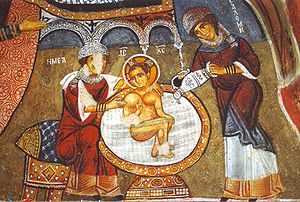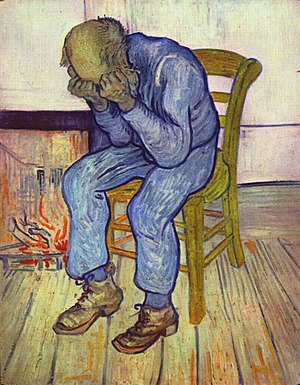The Battle of Hours
 I’m fascinated by how no matter how something is phrased, it can be right there in front of you, simple and plain as day, but that doesn’t mean you’ll hear it. I’m not talking about some ‘self-annointed’ gnostic’s personal interpretation of a religious text – I mean something that’s dyed in the wool tradition but still, somehow, eludes the grasp. When people ask, “Why didn’t Christ tell everyone what was coming and what to do about it?” the answer is ‘He did, but that doesn’t mean “everyone” or even many people have heard him.
I’m fascinated by how no matter how something is phrased, it can be right there in front of you, simple and plain as day, but that doesn’t mean you’ll hear it. I’m not talking about some ‘self-annointed’ gnostic’s personal interpretation of a religious text – I mean something that’s dyed in the wool tradition but still, somehow, eludes the grasp. When people ask, “Why didn’t Christ tell everyone what was coming and what to do about it?” the answer is ‘He did, but that doesn’t mean “everyone” or even many people have heard him.
I seem to have stumbled upon something effective for overcoming sin. I know our fathers have told me this. I can go to my library and come out with armloads of books that will tell me this. I know that it has passed through my ears. But I know I haven’t heard it. Or I’ve forgotten it, which happens too.
It seems counterintuitive (and almost cowardly) not to fight sin head on. Not to attack it where it is, or defend against it where it comes. The fathers have told me this lacks humility, that I am already beginning from Death, “in sin did my mother conceive me” – the very context of that fight and defense has itself been corrupted – how then do I presume that I can make a stand? But I have heard them and thought ‘what else can I do?’ I didn’t hear the rest of what they were saying. And I know something about synergy. I am not mystified as to what’s me and what’s God, as though I have not learned the Orthodox thinking in this matter. I don’t presume either to struggle alone, or to wait for God to come and save me. There is no struggle and no salvation that is not both of us fully engaged together – my will, my mind, my emotions, my body, and God’s energies as well.
But the other part of it – I didn’t realize is so effective. Fighting and defending *indirectly*. As I say, it’s counterintuitive (to a man infected with Death). But it seems that praying the hours, that pushing through to sing the liturgical prayers of our people, helps overcome sin, helps not only drive away the evil one, but make a mind for overcoming the world, and also a disposition to overcome the passions. It makes a self less inclined to sin in the body, which is somehow raised through prayer, as though less corruptible, and it makes a soul less inclined to interest in sin, as though the fullness of prayer has filled an aching void that sin always promises to fill but never does, require addict-like returning to the needle of passions.
Now the fathers have said again and again, “pray so that you might not fall into temptation”. They have bled their voice onto the ground before me with admonition and encouragement, and I have not heard them. And I have been proud. I have thought to fight and to defend, to take sin on head on. But this is arrogance, not bravery. And this “indirect”, “counterintuitive” fighting and defense – I think this is what they meant. I think they meant I’m incapable of winning, but if I turn to God not to fight for me, but to fix me, to fix the broken, damaged, savaged by Death corruption in soul and body that has eaten me away, then I will be raised to taste incorruptible life, and Death won’t succeed in owning me, forcing me back to the ‘needle’ of passion-addicted slavery.
I walk away from the Hours, and I don’t care about the ‘needle’. I walk away and am happier, and it lasts, and I want to return to the Hours. And I think that, if I don’t, I will be overcome again. The passions – pride, anger, rage, envy, fear, lust, vengeance – these will come for me and find me broken for them, open for them, unclothed, needing, agonizing, incomplete, with a void they crawl into like roaches into a gap in the wall. The prayers, said with every attempt at fitting attention and devotion, with persistence and sincerity, they place the house on a high rock.
It’s not like the noon witching hour on “church day” when drivers roar out of parking lots and onto roadways with their “how dare you get in front of me, I am important and not to be trifled with!”, and the restaurants and buffets are packed with “I demand service. I will be catered to. How dare you fail me in any way!” No, that would be stupid. I don’t mean walking away feeling so good about yourself that you won’t do bad things – won’t kill someone, but will burn in the acid bath of pride. I mean that if the prayers are fitting and devoted, it seems like God does what he promises, fills up the gap between the man standing saying them in his Death with unworthy lips and the goal to which he aspires. As C.S. Lewis said, God “directs our arrows to himself”, apart from which they could never hit anything except an idol of our deluded imaginations. And God saves through prayer, deifies one a little more, heals a little more the disease, and abides with one a little more when in the dark cave surrounded by the slaver and the enemy and the dire wolf. And it’s stronger. The center is more well, and it holds more easily, to cite Yeats.
For me, it is the ‘discipline’ to say the words in private, to stand in the icon corner and sing the hour without help, without others, without anyone but me and God and the Saints knowing I am there. Which is really not ‘discipline’, but it is discovering and ever rediscovering that comfort is there, healing is there, health and wellness are there, that God abides especially there, in those prayers said “fittingly and with devotion”. The synergy is in going out to meet him. “Keep me this night without sin.” It’s amazing that one could say these words many times and not realize that they are exactly what is happening – I am saying the words, for my part, fittingly and with devotion – and God is keeping me this night without sin. This is the simple prescription. This is what I must do. Not dig in, stand, and fight, which it is my inclination to do at the first sign of trouble. But flee to the ‘altar’, choose good ground there, and call upon the host of Heaven to come to my aid, trusting not even the words of my own imagination, but the time-honoured implements of holy men who have withstood flame and sword and tooth and claw, and are there in prayer with those who honour them.
Lord have mercy on my blindness. Pray for me those who see.




 When accused of a general failing – pride, foolishness, laziness, always agree. Be the first to admit it. You needn’t go out of your way to announce these passions, but the moment someone points the finger, join with them. When you accuse yourself, you avoid judgment. When you think them correct always in their observations, you avert the very passions attributed to you, and so overcome them. Don’t defend yourself. If they say, “So, you admit it!” say “Of course.” If they say, “then why don’t you change” say “because I am obstinate, too. Forgive me.”, or “that’s how far gone I am, pray for me”. It doesn’t matter whether technically they see anything real or not. God has granted them words, whether they are false prophets who pretend to see your sins instead of their own, or whether God is graciously reminding you of your sins. If you think with the fathers, you think that all these things that can be said about you are true, and that you cannot recount all the ways in which you have failed. If you think with the desert, you think that you fail in all ways, that every failure that can be attributed to you is true. But don’t be depressed by this, or let others insist that you be depressed. Shame is best expressed in acknowledgement and worship, not in self-pity. Genuine shame is in gratitude for being allowed to live without being struck down for your sins and utterly destroyed – weep over your sins, but don’t be destroyed by them, or it mocks God who has not destroyed you in judgment. If your accusers want you to fall down before them, you cannot – it is a thing you can only give to God. Even the angels do not ask as much. As the fathers say, “keep your mind in Hell and despair not”. So you can be cheerful, even tho remorseful, happy even though sad for your faults.
When accused of a general failing – pride, foolishness, laziness, always agree. Be the first to admit it. You needn’t go out of your way to announce these passions, but the moment someone points the finger, join with them. When you accuse yourself, you avoid judgment. When you think them correct always in their observations, you avert the very passions attributed to you, and so overcome them. Don’t defend yourself. If they say, “So, you admit it!” say “Of course.” If they say, “then why don’t you change” say “because I am obstinate, too. Forgive me.”, or “that’s how far gone I am, pray for me”. It doesn’t matter whether technically they see anything real or not. God has granted them words, whether they are false prophets who pretend to see your sins instead of their own, or whether God is graciously reminding you of your sins. If you think with the fathers, you think that all these things that can be said about you are true, and that you cannot recount all the ways in which you have failed. If you think with the desert, you think that you fail in all ways, that every failure that can be attributed to you is true. But don’t be depressed by this, or let others insist that you be depressed. Shame is best expressed in acknowledgement and worship, not in self-pity. Genuine shame is in gratitude for being allowed to live without being struck down for your sins and utterly destroyed – weep over your sins, but don’t be destroyed by them, or it mocks God who has not destroyed you in judgment. If your accusers want you to fall down before them, you cannot – it is a thing you can only give to God. Even the angels do not ask as much. As the fathers say, “keep your mind in Hell and despair not”. So you can be cheerful, even tho remorseful, happy even though sad for your faults.




![Reblog this post [with Zemanta]](http://img.zemanta.com/reblog_e.png?x-id=3209cf8d-31e6-4576-97e7-0cacdd17a378)

![Reblog this post [with Zemanta]](http://img.zemanta.com/reblog_e.png?x-id=6ea949b6-e042-4416-b043-5dcfec87e83d)

![Reblog this post [with Zemanta]](http://img.zemanta.com/reblog_e.png?x-id=d2b32a69-62d6-4a3b-aa4b-72ee94ca44d6)



![Reblog this post [with Zemanta]](http://img.zemanta.com/reblog_e.png?x-id=b0b663a1-3467-496b-83d1-2bbbb0dc01e4)


![Reblog this post [with Zemanta]](http://img.zemanta.com/reblog_e.png?x-id=88c639f0-5cf5-4863-acd9-e0c412e3d87c)